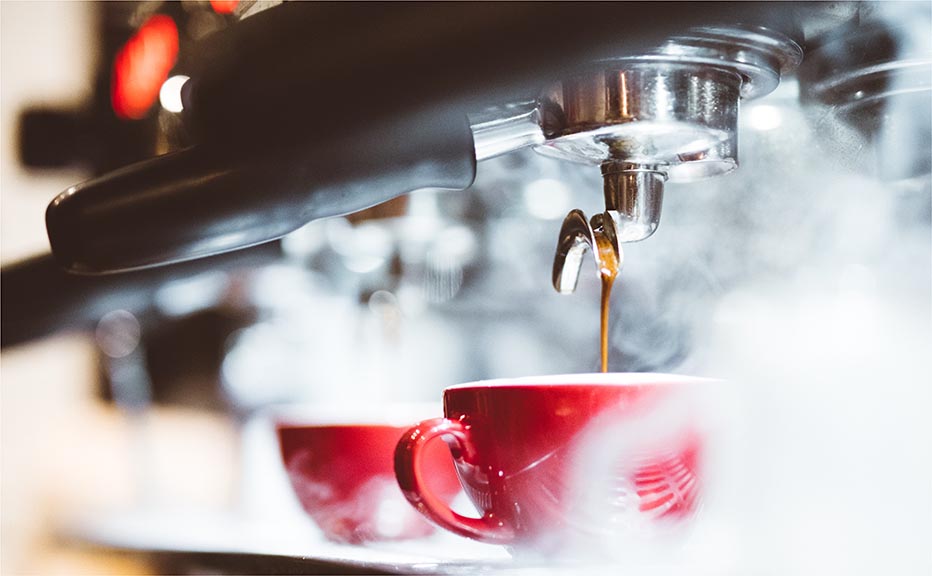Advanced Espresso Training
written by Rafael Hoekstra and Les Kuan
Acquiring A Higher Taste Perception
If you ask people what flavours they like in their coffee, typically you get a flow of vague words like ‘dark,’ ‘strong,’ and ‘bold’ because the majority of consumers simply have no idea how to describe the taste of coffee. If you then ask someone who actually knows how to taste coffee, they may respond with ‘sweet’ and ‘chocolatey’ as their most preferred flavours "oh and it's not bitter" (And this assumes that they haven’t actually added sugar to the coffee already).
Why are big corporations able to roast coffee to a bitter, oily dark crisp and have people keep coming back for more? Not because the coffee tastes good, but because the consumer has gotten used to the bitterness, and due to the fact that most coffee is prepared with a drip/brew coffee method. This is a relatively low intensity preparation method with the bitter compounds from the beans being basically watered down. On the other hand, the high pressure of the espresso method brings out even more intense unpleasant aspects of bitter.
Essentially, espresso is a magnifying lens and will reveal flaws in the roasted coffee, the coffee quality and even the barista skill. This means that a ‘robot barista’ who treats every roast the same, day in day out, will most likely miss the sweet spot, and cause the extracted flavour profile to vary. Most of the time the espresso will be ‘off,’ and in this case, ‘off’ generally means bitter.
In summary, until the level of barista training is raised, most cafes will continue to churn out bitter espressos. In turn, customers will continue to want lots of milk to take the edge off this, likely also adding sugar.
Advanced Barista Skills
It is up to baristas to change the false perception of espresso, one cup at a time. How? By learning to ‘dial-in’ their espresso.
‘Dialing-in’ is the art of getting to know every roast, every day, every hour and adapting to changes. It requires ongoing tasting of the coffee roasts flavour profile, which can shift during the day as the roast matures and the environment changes. Responding to these shifts, the barista will adjust the amount of coffee used, grind size and the extraction time accordingly.
This process is an ongoing pursuit of ‘the sweet spot’ within the espresso and is one of the many skills a barista must master to be considered a professional.
A barista who has skill in dialing-in will be keen to see his customers find a similar appreciation for the subtle flavours within the espresso. There is nothing more discouraging than finding the perfect extraction, only to see it obscured beneath three packets of sugar. Possessing a positive attitude, the barista can explain to receptive customers that the espresso is sufficiently sweet as it is, and encourage them to try it ‘sans sucre.’ ( but it's ok to add sugar once you've tasted it, just don't add sugar reflexively, like that guy who salts his food without tasting it )
The truth is, that many baristas surfing the Third Wave Artisan World of Coffee have already learned through extensive training, how to calibrate espresso and appreciate the flavours other than bitter, like sweet and fruity.
Unfortunately, many customers are not yet able to appreciate the same. While this can be frustrating for the barista, it is actually a big ask to expect customers to jump several steps in acquiring the ability through lots of experience to taste espresso all in one go.
How To Appreciate Espresso
Firstly, you need to taste it without milk and sugar. But more significantly, you need to shift your dependence away from the safety zone of vague descriptors like ‘dark,’ ‘strong’, ‘smooth’ and ‘bold.’
Roasters play a major role in all this too. If roasters don't roast well, their coffee will reinforce the bitterness bias in consumers and fulfill the expectation that coffee roasted for espresso is always bitter. Only when roasters introduce consumers to alternative espresso flavour profiles can they begin to educate consumers while at the same time begin to ‘dial-in’ their roasts to bring out a wider range of flavours.
This is comparable to whiskey, which to the untrained palate is fiery and unpleasant unless cut with coca-cola. However, when introduced to a quality single-malt whiskey by aficionados, we too can slowly learn to appreciate the subtleties and even drink it straight.
The Barista and Roaster Responsibility
Baristas have the primary role in changing this perception of espresso being bitter, both in learning to dial-in and in encouraging customers to acquire a taste for espresso. While not usually interfacing with customers, roasters too have an important role in changing this perception, by ensuring that they bring out the best from each bean. If we do not take responsibility for retraining our customers' palates, we will, in fact, be responsible for ingraining their perception of espresso as bitter and unpleasant. Furthermore, we will live up to the slanderous name of ‘coffee snobs!’
Until we step up to the plate on this, espresso will continue to be known as a bitter drink. But when we do step up, we will all be able to savour the flavour of a sweet lemon espresso from Guatemala.
Want to Learn how to 'dial-in' espresso coffee? Interested in learning more about tasting and improving your palette for coffee? Try our Barista Level One Course.



